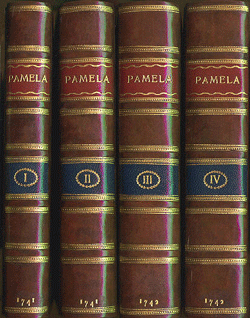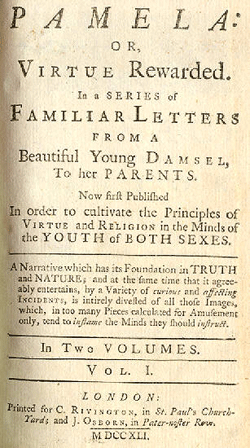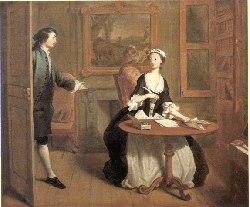E102B || Winter 2013 || Thinking about Self
Study Questions || Samuel Richardson's Pamela


More questions to follow. Do you have any that you would like to add to the list?
1. If you were making a Youtube video game of Pamela, what would the stages, obstacles, and rewards be (both interim and final)?
Does a video game fit Pamela? If yes or no, what does your answer tell you about her narrative?
2. Writing itself:
--Why does writing seem to make such a difference? The novel comes into being through writing. What would happen if the story were told from a 3rd. person point of view?
-- As an exercise, write a summary of Pamela that gives prominence to her letter writing.
--Is literacy important to the idea of self as conveyed by the novel?
--What does literacy make possible?
--What is "writing to the moment"? Richardson regarded it as his stylistic invention. But could we say that Descartes's Meditator "writes to the moment"?
3. Pamela & Casuistry:
What is casuistry?
--Why can it be associated, simultaneously, with scrupulousness and with laxity? In what sense is casuistical thinking admirable?
--How often does the word (or its variants: casuist; casuistical) appear in Pamela?
Which episodes seem to hinge on a casuistic understanding of the "self"?
Why does Mr. B call Pamela a casuist?
Is casuistry necessary for Pamela's survival?
What does casuistical thinking have to do with self-formation in the novel?
----Look for signs of compliance undercut by mental protest, for example, "Pray your Honour forgive me;--yet I know not for what. For he was always dutiful to his Parents; and why should he be angry, that I was so to mine!" (12).
--Does the relation between self-interest and casuistry undermine the concept of casuistry? Why or why not?
-- Casuistry centers on both self-interest and self-scrutiny. Is the second possible without the first?
--Why is casuistical reasoning important during this period?
-- Can you think of any situation in the relatively recent past that have created enough cultural pressure to require casuistical response?
-----Think "conscientious objector" during the Viet Nam war.
-----Think vegetarianism or non-vegetarianism.
-- Are you ever a casuist? Think of particular instances? Have you ever been in a moral bind? Have you ever acted against known, accepted principles and still defended yourself?
How does casuistry relate to self-defense? self-justification?
-- What does casuistry have to do with power?
--Closely analyze the following section:
She has been at me again to ask to stay, and humble myself, as she says. But what have I done, Mrs. Jervis, said I? If I have been a Sawce-box, and a Bold-face, and Pert, and a Creature, as he calls me, have I not had Reason? Do you think I should ever have forgot myself, if he had not forgot to act as my Master? Tell me, from your own Heart, dear Mrs. Jervis, said I, if you think I could stay and be safe? What would you think, or how would you act in my
Case? (Letter XIX, 40-1).
--Social (relative) duties vs. absolute duties
--What do you owe your parents (or grandparents or whoever helped to raise you)?
Have you ever had a conflict between what you owe to your parents and what you owe to something larger (society, God, an ideal of peace and justice) or to yourself?
If you think you ought or ought not to do something, how do you explain that to yourself? Where does the "ought" come from? What does it have to do with your "self"--with who you are?
--How can you describe Pamela's sense of duty? her sense of what she ought or ought not to do? How does she understand her strong sense that some things are ok and some things are not? Examine the following section closely:
Indeed, Sir, said I, it is impossible I should be ingrateful to your Honour, or disobedient, or deserve the Names of Boldface and Insolent, which you call me, but when your Commands ae contrary to that first Duty which shall ever be the Principle of my Life! (Letter XIV, p. 31).
But, Mrs. Jervis, continued I, let me tell you, that, I hope, if I was sure he would always be kind to me, and never turn me off at all, that I shall have so much Grace, as to hate and withstand his Temptations, were he not only my Master, but my King; and that for the Sin's sake. This my poor dear Parents have always taught me; and I should be a sad wicked Creature indeed, if, for the sake of Riches or Favour, I should forfeit my good Name; yea, and worse than any other young Body of my Sex; because I can so contentedly return to my Poverty again, and think it less Disgrace to be oblig'd to wear Rags, and live upon Rye-bread and Water, as I used to do, than to be a Harlot to the greatest Man in the World. (Letter XIX, 41)
4. Entertain & instruct: a formula for understanding fiction
We understand the "entertain" part but are often less interested in the "instruct" part. Have you ever been aware of learning something from a novel or a movie?
What do you think you have learne--
whether you were aware of it or not?
Imagine not being able to read. Imagine never going to a movie. What difference might that make to your life--and to your sense of who you are.
5. What kind of self does Pamela seem to have when she says to Mrs. Jervis: “Bread and water I can live upon, Mrs. Jervis, with content. Water I shall get any where; and if I can't get me bread, I will live like a bird in winter upon hips and haws, and at other times upon pig-nuts and potatoes, or turnips, or any thing”?
How is this bread-water-hips-haws self different from other ideas/images of the self that emerge in Pamela?
-- How does her bread-water-hips-haws diet compare to her father's hardship diet of "the Water and Clay of the Ditches I am forc'd to dig"? (13). And compare her own hardship diet on p. 15: "Bread and Water"; p. 41: to "live upon Rye-bread and Water."
What do you think of the word "damsel" on the title page? Have you ever met a damsel? Do "damsel" and "servant" go together?
6. Questions about social rank and the self
Pamela thematizes questions of social rank.
In which episodes are clothes a central, defining element of Pamela's exprience?
What does the painting above and at the left suggest about social relations in the novel? Is there any sense in which Pamela is equal to Mr. B? Who can see that?
PRACTICING CLOSE READING:
Look again at Mr. B’s offer (188ff):
Choosing details for comment:
Emphasis on property: 500 Guineas, recently purchased estate in Kent, rich Cloaths,
Two balanced columns
Pamela’s answer is longer than B’s proposal.She has a repeated opportunity to say “I.” “I will not”; “I reject it”; “I reject”; “I make no Free-will offering”; “I am also above”
Words like “poor Daughter” Poor man,” “poor Woman,”
Ditch, Dunghill, Monarch, Poverty, Meanness, “I have not once dared to look so high” “wretched Creature, whose only Pride was her Virtue”
Although the proposal itself is non-egalitarian, the two balanced columns create rhetorical equality. The format actually gives greater weight to the second column since Pamela’s response is longer than Mr. B’s proposal (she takes up more discursive space) since the opportunity to answer—uninterrupted-- allows her to have the last word.
Further the “answer” for which he asked (he no doubt expected it to be short) gives her the repeated opportunity to assert herself, to say “I”: “I will not”; “I reject it”; “I reject”; “I make no Free-will offering”; “I am also above.”
The potentially fawning (or perhaps more child-like or innocent) phrases that she uses to her parents (e.g. “poor me”_give way here to rhetorical polish or flourish: Words like “poor Daughter” Poor man,” “poor Woman” with their deliberate parallelism, are in this context an assertion of essential dignity, as are Ditch, Dunghill, Monarch, Poverty, Meanness.
As Pamela’s skillful (sometimes witty) use of language makes her seem on the whole safe, so here, her rhetorical power raises her above the status of servant he has mistreated.
The property he emphasizes--500 Guineas, recently purchased estate in Kent, etc.—shows what Pamela is up against. It also allows for a dramatic face-off between material and spiritual value, making the servant more noble because of her virtue than the master, with his assertion of the power that rests on property.
